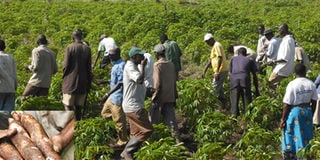Prime
Feeding Karamoja with cassava

Farmers weeding a cassava plantation in alekilek village in Moroto District. it is hoped that the crop, will put food on more tables. PHOTO BY STEVEN ARIONG.
What you need to know:
Mr Loput, who along with his family were weeding their one-acre cassava garden at Alekilek, said. The father of four says he doesn’t regret abandoning pastoralism and devoting his time to crop farming.
On a recent trip to Moroto Town, I was surprised to see an extensive cassava plantation in Alekilek Village, Iriir Sub-county in Moroto District, a place renowned for being arid. As I looked on, wondering how the young plantation was surviving with the soaring temperatures and who the owner could be, I saw Karimojong men, women, and children busy weeding the cassava plantation.
Seeing the men digging alongside their wives and children was another surprise. For all the times I have visited the area, I only saw young men by the road side rearing animals or selling crafts (stools, necklaces, and armlets) in Moroto town. In this society, crop farming is often practiced by women who own modest gardens. “When new advancements come and are in line with developing our region, we have to embrace them,” Mr Leo Loput responded when I asked why men were abandoning their customary duties to start farming. “We are changing strategy now. We need to end this relief-dependency era. We think it’s time for Karamoja to produce its own food,” Mr Loput, who along with his family were weeding their one-acre cassava garden at Alekilek, said. The father of four says he doesn’t regret abandoning pastoralism and devoting his time to crop farming.
Rewarding
Loput, who is also the Alekilek Village Chairman, says ever since he started farming last year with the help of humanitarian organisations, his family’ standard of living has improved. He says he can now pay tuition fees for his three children in Moroto High School as well as for one waiting to join secondary this month. “In fact I regret the time I wasted participating in raids and looking after cattle, which warriors would steal the next day,” he says. Loput is one of the beneficiaries of the Karamoja Food Security programme, funded by two UN agencies – World Food Programme (WFP) and Food and Agricultural Organisation (Fao).
Fao and WFP opened up 400 acres of land in Alekilek, partitioned it into plots and offered it to residents to grow food. The organisations also distributed cassava cuttings to whoever received a plot to help the Karimojong grow their own food. Ms Agnes Naput, another beneficiary, says her future looks bright now because she can grow her own food and earn a small income as well. “If this programme can be rolled out to cover the whole region, the question of food insecurity will be addressed,” she says. Ms Naput, a widow, says she has also managed to acquire maize and sorghum seeds from a friend in Soroti to plant alongside cassava to have more food.
According to Mr Bai Mankay Sankho, the WFP Manager in charge of Karamoja region, the project targets to produce a large farm that will in future supply cassava cuttings to the whole region of Karamoja. He says they are encouraging block farming in the region because it’s the only way the Karimojong can cope with several challenges they face while farming. “We believe that building communities’ capacity through agriculture will help fight poverty and hunger in the region especially once we stop giving out food aid,” he says, adding that a similar programme is being implemented in Kakomongole in Nakapiripirit where about 200 acres were opened up and given to farmers to grow cassava.
There are plans to extend the projects to Kotido and Kaabong districts this year. With its unreliable and erratic rains, scorching sunshine and insecurity, Karamoja has been less productive in terms of food production. Despite its fertile soils, the region has endured food shortage for decades, forcing residents to largely depend on humanitarian food aid. As you visit the homesteads (manyattas), it’s very rare to find a family that can afford two meals a day.
And with this perplexing climate change, specialists say the situation is worsening day by day and they predict that in the near future, more people would be at risk of starving to death. “More people are willing to go into farming since livestock is reducing in the area. Many are taking to farming though in most cases, they don’t harvest,” Mr John Lodungokol Obentakula, Moroto District Agricultural officer says. If the region can be supported with irrigation systems to supplement the unreliable rainfall during dry spells, it can become a food basket. Mr Obentakula says crop farming is the way to go since raiders have made livestock ownership hazardous. “Owning livestock here is similar to tying a rope around your neck,” he said.
Karamoja region, which comprises six districts, Abim, Kotido, Moroto, Kaabong, Nakapiripirit and Amudat remains the most illiterate region in Uganda, with an 80 per cent illiteracy rate and 82 per cent of the population living below the poverty line. Despite the provision of free primary and secondary education by the government, over 60 per cent of school-age children are not in school. Reports also indicate that completion rate stands at only 10 per cent.
Encouraging residents to practice block farming follows a call by the Agriculture Ministry to farmers to adopt commercial farming to boost production. Recently, the Minister of Agriculture, Hope Mwesigye, said it would be easier for the government to introduce irrigation schemes in Karamoja once residents adopt block farming. She however added that supporting each individual farmer with irrigation systems is unaffordable and unsustainable.
Additional reporting by Joseph Miti




